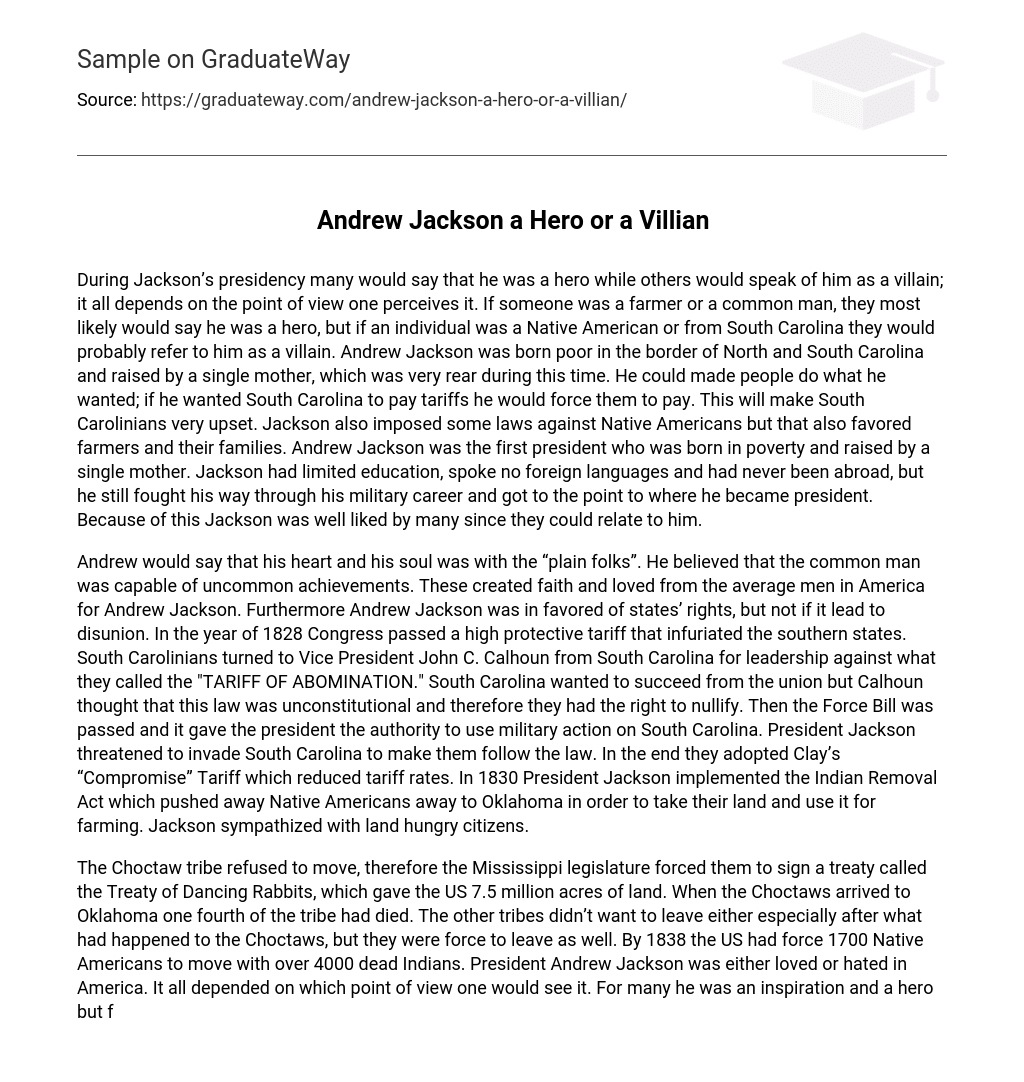During Jackson’s presidency many would say that he was a hero while others would speak of him as a villain; it all depends on the point of view one perceives it. If someone was a farmer or a common man, they most likely would say he was a hero, but if an individual was a Native American or from South Carolina they would probably refer to him as a villain. Andrew Jackson was born poor in the border of North and South Carolina and raised by a single mother, which was very rear during this time. He could made people do what he wanted; if he wanted South Carolina to pay tariffs he would force them to pay. This will make South Carolinians very upset. Jackson also imposed some laws against Native Americans but that also favored farmers and their families. Andrew Jackson was the first president who was born in poverty and raised by a single mother. Jackson had limited education, spoke no foreign languages and had never been abroad, but he still fought his way through his military career and got to the point to where he became president. Because of this Jackson was well liked by many since they could relate to him.
Andrew would say that his heart and his soul was with the “plain folks”. He believed that the common man was capable of uncommon achievements. These created faith and loved from the average men in America for Andrew Jackson. Furthermore Andrew Jackson was in favored of states’ rights, but not if it lead to disunion. In the year of 1828 Congress passed a high protective tariff that infuriated the southern states. South Carolinians turned to Vice President John C. Calhoun from South Carolina for leadership against what they called the “TARIFF OF ABOMINATION.” South Carolina wanted to succeed from the union but Calhoun thought that this law was unconstitutional and therefore they had the right to nullify. Then the Force Bill was passed and it gave the president the authority to use military action on South Carolina. President Jackson threatened to invade South Carolina to make them follow the law. In the end they adopted Clay’s “Compromise” Tariff which reduced tariff rates. In 1830 President Jackson implemented the Indian Removal Act which pushed away Native Americans away to Oklahoma in order to take their land and use it for farming. Jackson sympathized with land hungry citizens.
The Choctaw tribe refused to move, therefore the Mississippi legislature forced them to sign a treaty called the Treaty of Dancing Rabbits, which gave the US 7.5 million acres of land. When the Choctaws arrived to Oklahoma one fourth of the tribe had died. The other tribes didn’t want to leave either especially after what had happened to the Choctaws, but they were force to leave as well. By 1838 the US had force 1700 Native Americans to move with over 4000 dead Indians. President Andrew Jackson was either loved or hated in America. It all depended on which point of view one would see it. For many he was an inspiration and a hero but for others such as the Native American and some Southern Sates he was a villain. Jackson was the first president born in poverty which made many average Americans like him and relate to him. Although South Carolinians were infuriated by him when he imposed some tariffs that they considered unfair to them. He also wanted to help citizens that had no land but in order to help them he affected many Native American tribes and took away their land. It all just depends on the point of view one sees Andrew Jackson.
Bibliography
- Mrs. Byrne class notes on The Presidency of Andrew Jackson “About the Series.” PBS. PBS, n.d. Web. 28 Oct. 2013. .
- “24c. The South Carolina Nullification Controversy.” The South Carolina Nullification Controversy [ushistory.org]. N.p., n.d. Web. 28 Oct. 2013.
- “24c. The South Carolina Nullification Controversy.” The South Carolina Nullification Controversy [ushistory.org]. N.p., n.d. Web. 28 Oct. 2013.





